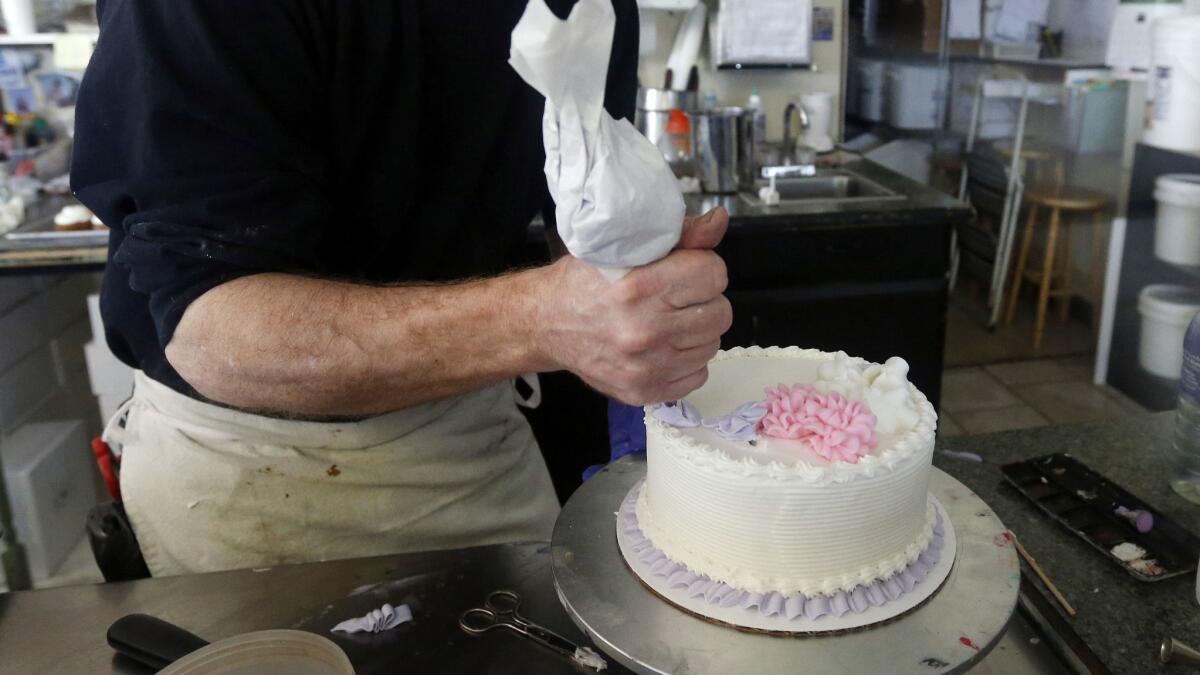Editorial: The Supreme Court squanders an opportunity for lasting justice in the wedding cake case

The Supreme Court on Monday issued its long-awaited ruling in the case of a Colorado baker who claimed a 1st Amendment right to refuse to provide a wedding cake to a gay couple. The 7-2 decision in his favor is a major disappointment, even if it isn’t the disaster for gay rights that it could have been.
Jack Phillips is a Christian baker who believes that “God’s intention for marriage from the beginning of history is that it is and should be the union of one man and one woman.” In 2012 he refused to “create” a wedding cake for Charlie Craig and Dave Mullins. The Colorado Civil Rights Commission, in a ruling affirmed by the Colorado Court of Appeals, found that Phillips had violated the state’s Anti-Discrimination Act.
In his appeal, Phillip’s made two constitutional arguments. One was that being required to create a cake for a same-sex wedding celebration was a form of “compelled speech”; the other was that it would violate his right to the free exercise of religion.
The Supreme Court, however, ducked the big issues. What it should have said is that while Phillips’ beliefs are worthy of respect, they are not a license to engage in discrimination. Despite Phillips’ insistence that his style of cake-making is so artistic and expressive that it deserves protection as free speech, the reality is that his line of work makes him more like a caterer than a speechwriter. While a speechwriter might legitimately refuse to craft a message for a potential client with whom he disagreed, the law has generally required restaurateurs, hairstylists, shopkeepers and other such business people to serve all comers.
Instead, Justice Anthony M. Kennedy gave relatively short shrift to the free-speech argument, focusing instead on the issue of religious freedom.
He said that the judgment against Phillips had to be set aside because the state’s consideration of his case was marred by a hostility to his faith that was “inconsistent with the 1st Amendment’s guarantee that our laws be applied in a manner that is neutral toward religion.” He noted several insensitive comments about religion made by members of the Civil Rights Commission — and on that basis, overturned Colorado’s findings in favor of the gay couple.
The Supreme Court ducked the big issues.
Supporters of equal rights for gays and lesbians can take some comfort from the narrowness of the decision. Kennedy acknowledged that while religious objections to same-sex marriage are protected by the Constitution, “it is a general rule that such objections do not allow business owners and other actors in the economy and in society to deny protected persons equal access to goods and services.”
That suggests the court might rule differently the next time a baker — or florist or hair stylist — refuses to serve a same-sex couple in violation of anti-discrimination laws. But there wouldn’t have to be a next time if the court had confronted the issue squarely in this case.
Follow the Opinion section on Twitter @latimesopinionand Facebook
More to Read
A cure for the common opinion
Get thought-provoking perspectives with our weekly newsletter.
You may occasionally receive promotional content from the Los Angeles Times.










